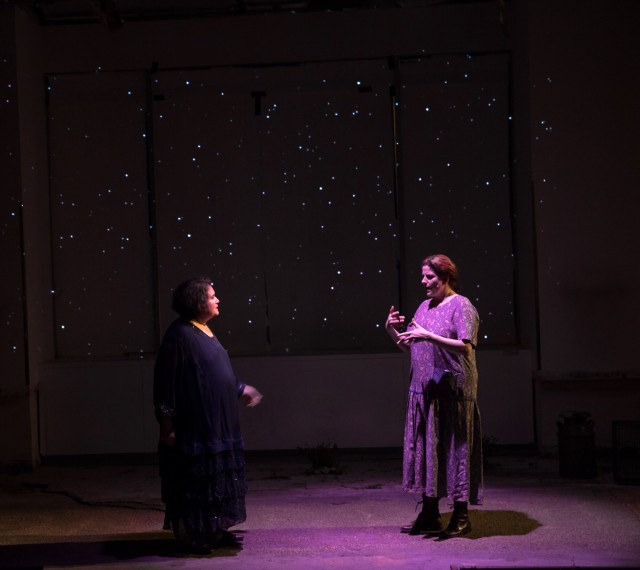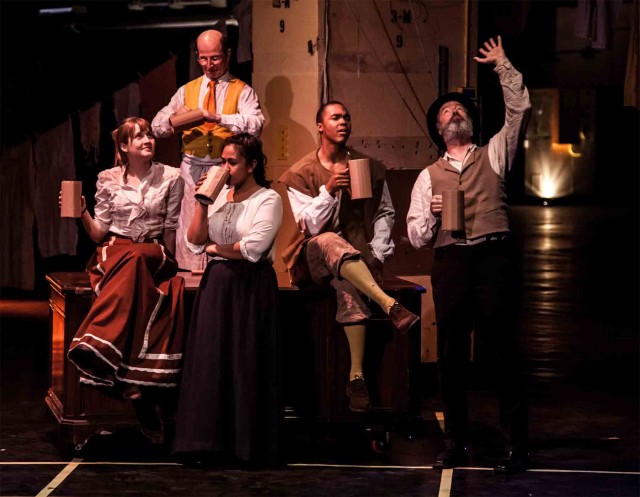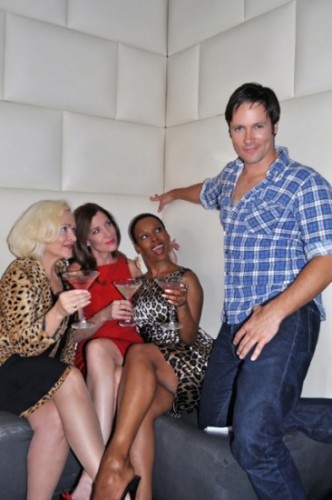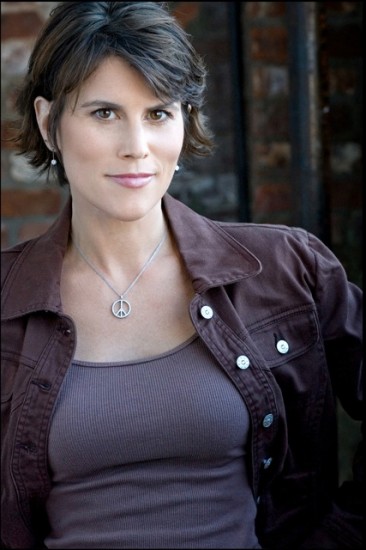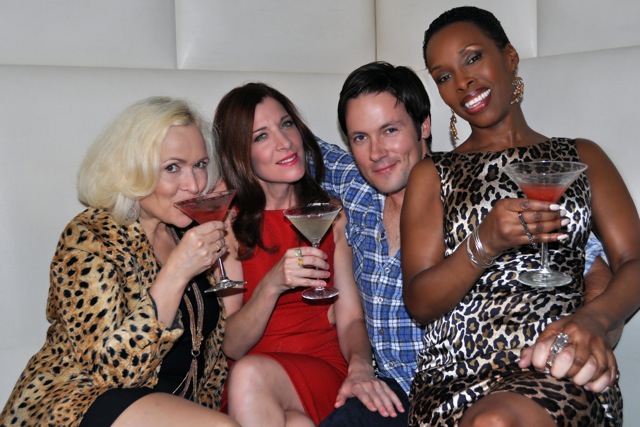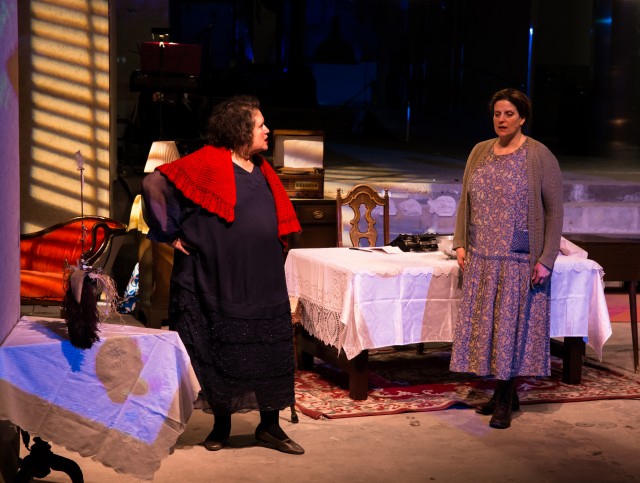
Sisters Dalia (Nomi Tichman) and Ada (Catherine Porter) reconnect in FLOYDADA (photo by Dan Lane Williams)
Peculiar Works Project
Merchants Square Building
40 Worth St. between Church St. & West Broadway
Wednesday – Saturday through April 11, $12-$18, 7:00
www.peculiarworks.org
When you think of the revolutionary art movement known as Dada, West Texas is not generally one of the first things that comes to mind. But in the early 1990s, playwright Barry Rowell was driving to Lubbock when he saw a sign for the small town of Floydada, Texas, and decided right then and there that he was going to write a play that involved Dadaism. The result is Floydada, a two-character show running through April 11 in a large, empty storefront in the Merchants Square Building on Worth St. The premise is a bit thin, as well as somewhat random — which, of course, is a key element of Dada. But you don’t have to know anything about Dada — the experimental movement, based on readymade objects and chance, that developed from a disgust with the death and destruction of WWI — to understand the play; after all, “Dada does not mean anything,” Tristan Tzara wrote in his 1918 manifesto. It’s March 1927, and Dalia (Nomi Tichman) is ill, so she has returned home to be with her sister, Ada (Catherine Porter), in the small town of Floydada. Dalia has spent the last several decades primarily in New York, Berlin, and Paris — France, not Texas — writing poetry, giving performances, and hanging out with the cultural elite, including the Baroness Elsa von Freytag-Loringhoven, a close friend with whom she continues to exchange letters. Elsa has also given Dalia one of her most famous sculptures, “Portrait of Marcel Duchamp,” an avant-garde work that mystifies Ada almost as much as her sister’s activities do. Over the course of ten months, the sisters reconnect, the city girl and the country girl learning from each other and even performing together, turning the family’s dry goods store into a cabaret where they sing and recite poetry for the close-knit local community.
When Dalia first suggests that they perform, she tells Ada, “All we need is an empty space.” The same can be said for Peculiar Works Project, the Obie-winning company, cofounded by Porter, Rowell, and Ralph Lewis in 1993, that specializes in experimental productions in unusual spaces. In 2013, they presented Rowell’s Manna-Hatta in multiple rooms upstairs in the James A. Farley Post Office. Floydada takes place on the ground floor of the Merchants Square Building, which was built in 1928, right around the time in which the play is set. One side of the long, horizontal room, which boasts large pillars, a cement floor, and an open ceiling revealing pipes, wires, and insulation, has been filled with new Dada-inspired art by Carlo Adinolfi, Michelle Beshaw, Myrel Chernick, Norman Chernick-Zeitlin, Anna Kiraly, Ray Neufeld, and Francesco Vizzini. A makeshift box-office area features a urinal tip jar and a slideshow of Dada artists. The play itself unfolds in an open area with some furniture, as the two actors wander from living room to outside road to dry goods store, using sound to indicate their coming and going. Porter and Tichman portray Ada and Dalia with an oddball eccentricity that is reminiscent of the mother and daughter Bouvier Beales from Grey Gardens, though not nearly as off the wall. “People think you’re strange, you know,” Ada says, to which Dalia replies, “I am.” Director David Vining (Cracked, The Blue Puppies Cycle) makes creative use of the space, though a lot of the movement grows repetitive; at times you’ll just wish the characters just stayed put for a few moments instead of constantly getting up and down and moving back and forth on Casey McLain’s set. Yoonmi Lee adds fine piano and percussion, while Lianne Arnold’s projections and Leila Ghaznavi’s live manipulations (and sound effects) are colorful but confusing. The overall aesthetic has a sweetly innocent DIY charm, as well as plenty of strangeness, but it’s probably about twenty minutes too long, which, in its own way, is rather Dada itself. It’s also extremely cold in the space, with no heating, so be prepared to leave your coat and hat on if the weather remains so bitter. Floydada runs Thursdays, Fridays, and Saturdays through April 11; there will be a “Dada (Re)Creation” benefit on April 6 with dance, music, art, and poetry, and the April 9-11 shows will be followed by a DadaDialogue with Pratt professor Dr. Dorothea Dietrich and other panelists.
